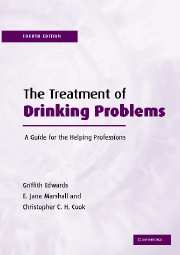Book contents
- Frontmatter
- Contents
- A note on the fourth edition
- Acknowledgements
- Introduction
- Part I Background to understanding
- 1 The history of treatment for drinking problems
- 2 Causes of drinking problems
- 3 Alcohol as a drug
- 4 The alcohol dependence syndrome
- 5 Drinking problems and the family
- 6 Social complications of drinking
- 7 Drinking problems as cause of neuropsychiatric disorders
- 8 Alcohol problems and psychiatric co-morbidity
- 9 Alcohol and other drug problems
- 10 Physical complications of excessive drinking
- 11 Women with drinking problems
- 12 Some special presentations
- 13 Drinking problems and the life course
- Part II Screening, assessment and treatment
- Author index
- Subject index
- References
8 - Alcohol problems and psychiatric co-morbidity
Published online by Cambridge University Press: 11 August 2009
- Frontmatter
- Contents
- A note on the fourth edition
- Acknowledgements
- Introduction
- Part I Background to understanding
- 1 The history of treatment for drinking problems
- 2 Causes of drinking problems
- 3 Alcohol as a drug
- 4 The alcohol dependence syndrome
- 5 Drinking problems and the family
- 6 Social complications of drinking
- 7 Drinking problems as cause of neuropsychiatric disorders
- 8 Alcohol problems and psychiatric co-morbidity
- 9 Alcohol and other drug problems
- 10 Physical complications of excessive drinking
- 11 Women with drinking problems
- 12 Some special presentations
- 13 Drinking problems and the life course
- Part II Screening, assessment and treatment
- Author index
- Subject index
- References
Summary
Anyone working in the field of drinking problems must cultivate an awareness of the range of mental illnesses that may result from, or lie behind, the drinking. Very serious issues will otherwise be overlooked. Alcohol problems and psychiatric disorders are both common and some degree of overlap should be expected in any population. More importantly, alcohol is a readily available medication for many types of mental distress, and in these cases drinking is a complication of the underlying and primary pathology. Some aspects of the relationship between personality, mental illness and alcohol problems have already been touched on briefly in Chapter 2 when discussing the causes of excessive drinking.
In the Epidemiologic Catchment Area (ECA) study, 37% of individuals in the general population with an alcohol disorder also experienced another psychiatric disorder (Regier et al., 1990). The most common co-morbid disorders were anxiety disorders (19%), antisocial personality disorders (14%), affective disorders (13%) and schizophrenia (4%) (Helzer and Pryzbeck, 1988; Table 8.1).
Another American survey, the National Co-Morbidity Survey (NCS), reported a slightly higher level of co-morbidity (Kessler et al., 1994, 1997). The evidence for lifetime co-morbidity was stronger for alcohol dependence than for alcohol ‘abuse’, and co-morbidity was more likely to occur in women than in men. Anxiety and affective disorders were the main contributors to co-morbidity in women. The predominant co-morbid disorders among men were substance use disorders, conduct disorder and antisocial personality disorder (ASPD).
Information
- Type
- Chapter
- Information
- The Treatment of Drinking ProblemsA Guide for the Helping Professions, pp. 110 - 132Publisher: Cambridge University PressPrint publication year: 2003
